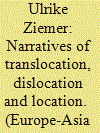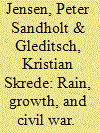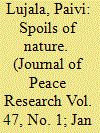| Srl | Item |
| 1 |
ID:
147231


|
|
|
|
|
| Summary/Abstract |
While the percentage of women publishing in African Affairs and The Journal of Modern African Studies from 1993 until 2013 has increased, the percentage of articles by Africa-based authors has declined. We present evidence suggesting that this decline is not being driven by lower submission rates from Africa but rather by low and declining acceptance rates. We also find that Africa-based scholars, but not women, are systematically cited less than others. We then analyse article titles and find preliminary evidence suggesting that Africa-based authors are more likely to write on a small number of countries and less likely to generalize. Authors based outside Africa seem more likely to generalize to the continent and are more likely to write on economics or conflict. These patterns have implications for the diversity of the discipline and the state of our knowledge about Africa.
|
|
|
|
|
|
|
|
|
|
|
|
|
|
|
|
| 2 |
ID:
185077


|
|
|
|
|
| Summary/Abstract |
Within recent critical debates about the geographies and circulations of counterinsurgency knowledge, scholars have focused primarily on dominant centres of power and authority in the global North. Building a framework drawn from critical geography, this article decentres these locations and actors by exploring the global production and circulation of counterinsurgency knowledge from the vantage point of Indian strategic thinkers. Focusing on the work of the Indian think tank the Institute for Conflict Management (ICM), the article traces how Indian counterinsurgency knowledge has been produced, packaged and circulated transnationally since the late 1990s. It argues the power and utility that forms of counterinsurgency knowledge command – Indian or otherwise – are never reducible to the essential features of what actors or texts say. Rather, it suggests that counterinsurgency knowledge is produced through particular relations and locations of power-knowledge that define what they represent and where they fit in. It theorizes forms of counterinsurgency knowledge as positions within broader transnational forces, entwined with colonial histories of pacification. In doing so, it illuminates the contestations and forms of work involved in staging or organizing the world through practices that make some forms, actors, and locations important and relegate others to the peripheries of global politics.
|
|
|
|
|
|
|
|
|
|
|
|
|
|
|
|
| 3 |
ID:
170344


|
|
|
|
|
| Summary/Abstract |
Using a unique data set of Chinese foreign direct investment (FDI) contracts from the 1980s and early 1990s, we explore those mechanisms of historical persistence resulting from China's unique colonial experience. Adopting difference-in-differences as well as difference-in-difference-in-differences analysis within conditional logit, we provide evidence that foreign investors favored locating FDI in Chinese cities in which their home country had a colony in the 19th century and that a human-capital channel best explains this persistent impact of colonial experience. While alternative explanations for long-term persistence are not consistent with the empirical findings, the results suggest that legal human capital inherited from colonial times affected economic decisions after 1978. Thus, we attempt to advance the literature on history's long-lasting influence by proposing one particular mechanism of persistence—memory of legal institutions, or inheritance of legal human capital.
|
|
|
|
|
|
|
|
|
|
|
|
|
|
|
|
| 4 |
ID:
141513


|
|
|
|
|
| Summary/Abstract |
Throughout history and up until the middle of the twentieth century, available information about Najd, the vast central region of the present-day Saudi Arabia, had generally been scarce, especially in languages other than Arabic. Najd of the past had a unique and distinctive culture that deserves to be known in the West. This article aims at briefly examining available information concerning Najd from antiquity up until the middle of the twentieth century, showing that more than one factor participated in the shortage of information concerning Najd of the past and its culture. The objective of this article is to define the physical features of Najd in order to show how these features had participated in its external isolation and eventually the lack of information encompassing the unique culture of Najd of the past. A brief review of the history of Najd provides the necessary information on how Najd had suffered from neglect, misunderstanding, and underestimation of its culture. This article ends by referring to the fact that time, with its change of circumstances, has brought and is still bringing more on the past of Najd and its inhabitants and culture.
|
|
|
|
|
|
|
|
|
|
|
|
|
|
|
|
| 5 |
ID:
087815


|
|
|
|
|
| Publication |
2009.
|
| Summary/Abstract |
The findings presented here are based on ethnographic research and are concerned with subjective definitions of ethnic belonging of young Armenians in Krasnodar krai. It is demonstrated that Armenian ethnic identifications are not 'fixed' but rather entwined within a complex web of diverse cultural attachments, involving many 'routes' of translocation, dislocation and location. It was found that most of the research participants saw themselves as Armenian while drawing occasionally on cosmopolitanism as an identity resource. This enabled them to construct a sense of belonging both in terms of ethnicity and of multicultural location.
|
|
|
|
|
|
|
|
|
|
|
|
|
|
|
|
| 6 |
ID:
091720


|
|
|
| 7 |
ID:
093599


|
|
|
|
|
| Publication |
2010.
|
| Summary/Abstract |
Why is armed civil conflict more common in resource-dependent countries than in others? Several studies have attempted to unravel mechanisms on why natural resources are linked to armed conflict, but no coherent picture has yet emerged. This article seeks to address this puzzle by concentrating on the issue of how rebel access to natural resources affects conflict. It uses data on gemstone and hydrocarbon localities throughout the world and controls for the spatial and temporal overlap of resources and conflict. The results show that the location of resources is crucial to their impact on conflict duration. If resources are located inside the actual conflict zone, the duration of conflict is doubled. Interestingly, oil and gas reserves have this effect on duration regardless of whether there has been production or not. In addition, a country-level analysis suggests that oil production increases the risk of conflict onset when located onshore; offshore production has no effect on onset. These results support the assertion that natural resources play a central role in armed civil conflicts because of the incentives and opportunities they present for rebel groups.
|
|
|
|
|
|
|
|
|
|
|
|
|
|
|
|